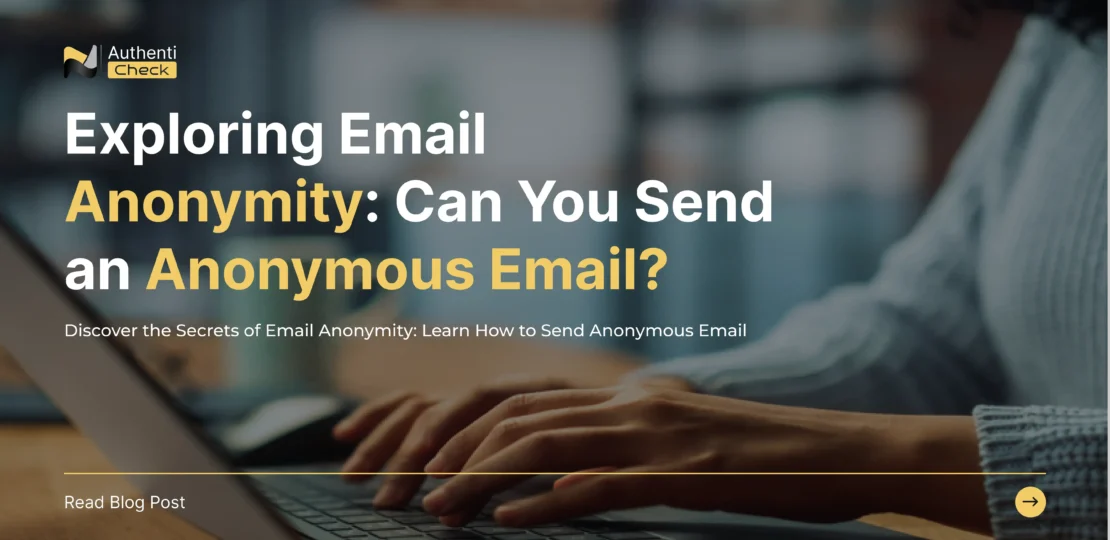Exploring Email Anonymity: Can You Send an Anonymous Email?
July 24, 2024 | by e.divedeepai@gmail.com

In today’s digital landscape, the significance of email as a primary mode of communication remains indisputable. Yet, there are instances where privacy concerns compel individuals to explore the option of sending emails anonymously.
This raises a pivotal question: Can true email anonymity be achieved? Delving into this query reveals a multifaceted pursuit driven by various compelling reasons. From whistleblowers needing protection to individuals safeguarding personal information, the quest for anonymity underscores critical needs in our interconnected world.
The Quest for Anonymity: Why Use Anonymous Email?
Various significant reasons drive the quest for anonymity through anonymous email addresses. For instance, whistleblowers often need anonymity to safely expose wrongdoing without fear of retaliation. Similarly, victims of harassment or abuse might choose to report their experiences anonymously to avoid further harm. Organizations seeking honest feedback may deploy anonymous email surveys to ensure respondents can share their views freely without fear of repercussions.
Additionally, many individuals highly value their privacy and prefer to keep their personal email addresses confidential when making inquiries or participating in online activities, safeguarding their personal information from potential misuse.
The Myth of True Anonymity: Challenges and Risks
Achieving true anonymity when sending emails is like building a sandcastle against the tide. Even with tools like VPNs, your IP address might be logged by email providers, and browser fingerprinting can potentially expose your device. Emails themselves carry hidden clues – metadata like timestamps and routing paths – that could reveal your location or activity patterns.
Finally, signup for most email services requires some personal information, which, while you might use fake details, could be exposed through legal means. While complete anonymity might be a fantasy, these measures can significantly enhance your email privacy.
Approaches to Enhance Email Privacy
- Temporary Email Services
There are services in the market that offer disposable email addresses that self-destruct after a set time. This protects your permanent address but provides limited anonymity due to the temporary nature and potential association with spam.
- Anonymous Email Providers
Services like ProtonMail and Tutanota prioritize user privacy. They offer strong encryption and don’t require extensive personal information during signup. However, even these providers can be compelled by law enforcement to reveal user data under specific circumstances.
- Virtual Private Networks (VPNs)
VPNs mask your IP address, making it appear as if you’re connecting from a different location. This enhances anonymity by hiding your geographical footprint.
Fake Email Verification
Forget trusting an email address at face value. Verification tools like authenticheck.co can help sniff out potential fakes. These services often act as email detectives, checking for red flags like:
- Disposable Email Providers
They identify email addresses linked to known temporary email services, often used for one-time signups or masking identities.
Also read: What Is Temp Email And Why You Should Care About It?
- Domain Validation
They act like domain name detectives, verifying if the email’s domain (the part after the “@”) exists. A non-existent domain screams “fake”!
- Spam Mail Checkers
They compare the email address against blacklists of known spammers. A match suggests the sender might be out to phish or deceive you.
The Takeaway: Balancing Privacy and Security
In navigating email privacy, it’s crucial to understand the nuances of achieving anonymity versus security. While complete email anonymity proves challenging, several strategies can bolster privacy:
- Assess Your Needs
Determine the level of anonymity required. Temporary email solutions offer basic privacy, whereas services combining anonymous email providers with VPNs provide more robust protection.
- Legal Implications
Recognize that anonymity doesn’t absolve accountability for unlawful activities. Law enforcement agencies retain the capability to trace the origin of emails in serious legal matters. Balancing these factors ensures a prudent approach to managing email privacy and security concerns effectively. By tailoring strategies to individual needs and understanding the limitations of anonymity, users can make informed choices to safeguard their digital communications appropriately.
- Security Awareness
Be mindful that some anonymous email services may prioritize anonymity over stringent security protocols. Exercise caution when transmitting sensitive information through such platforms.
Exploring Alternatives: When Email Anonymity Isn’t an Option
When achieving complete email anonymity proves challenging, exploring alternative communication methods becomes essential for maximizing privacy. Encrypted messaging apps like Signal offer robust end-to-end encryption, guaranteeing that only designated recipients can access messages, thereby enhancing confidentiality significantly.
Additionally, platforms such as Reddit provide options for anonymous posting, although forum administrators retain the ability to monitor user activities within their systems. While these alternatives prioritize user privacy, it is crucial to evaluate each platform’s security protocols and potential for tracking to make informed choices that align with personal privacy needs beyond conventional email channels.
Conclusion
Email anonymity exists on a spectrum, not a binary. While complete anonymity might not be achievable, there are steps you can take to increase your email privacy. Before sending an anonymous email, assess your needs, weigh the risks and limitations, and choose the approach that best suits your situation. Remember, even the most advanced methods can’t guarantee complete anonymity. Always prioritize security when dealing with sensitive information.